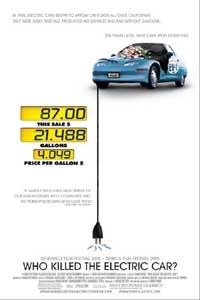Movie Review: Who Killed the Electric Car? (2006)

Who Killed the Electric Car? (2006)
Starring: Martin Sheen [narrator], Phyllis Diller, Colette Divine, Mel Gibson, Tom Hanks, Peter Horton, Ralph Nader, Alexandra Paul, Chelsea Sexton, J. Karen Thomas
Directed by: Chris Paine
I guess the first thing you should know about me when reading this review is that I'm not a huge environmentalist, but I still feel pretty passionately about how we're destroying our planet. My feeling on the price of oil is that it obviously isn't high enough, if people in North America keep buying more and more cars with worse and worse fuel economy. If you're all proud of your new SUV, you probably shouldn't brag about it to me, because I'll be less than impressed. If you're my friend, I probably won't be too much of a dick about it, but in my head I'll be thinking "I hope you enjoy that Earth-raping replacement penis that you have no need for". Unless you happen to be a park ranger or something, but, to the best of my knowledge, I have no park ranger friends.
So when I saw the online trailer for this movie, I knew it would play right into my beliefs. I'm a big believer in finding fuel alternatives, and wondered what happened to electric cars. I remember seeing charging station at LAX last time I was there, but didn't think that anyone still drove EVs (electric vehicles). When this documentary suggested that something more sinister was afoot in the disappearance of EVs, my curiosity was piqued. Did the oil companies, government, and car manufacturers join forces to kill the electric car?
It is an interesting idea, and it made for an interesting movie. Sadly, it didn't lead to a very good movie. Written and directed by Chris Paine, a former proud GM EV1 driver, the movie features interviews by other former EV1 drivers (there were no owners, as GM only leased the vehicle) such as Tom Hanks (via The Late Show clips), Phyllis Diller, Baywatch's Alexandra Paul, and a pre-crazy Mel Gibson (who looks even crazier in this movie due to his hermit beard than he does in his mug shot), along with industry experts. Unfortunately, the movie comes off too much as Paine's ode to his long-lost car (GM, along with all the other manufacturers of EVs, recalled all their leased EVs and had them destroyed), than a true examination on why electric cars ceased to exist a few years after they proved a viable alternative to the internal combustion engine.
Which is fine, if you are one of the small percentage of Californians who once had an electric vehicle. But, for the rest of us, the near-fetish levels of longing and activism these drivers undertook to save their cars and the length of time the movie spends showing it made them all look a little silly. I think it was important to show the enthusiasm that former EV drivers had for their cars, but this movie goes too far in this respect, and it isn't terribly interesting. The cars are gone, and they're not coming back. So let's focus on the whys, not the whens.
When the movie shifted focus from how much people loved one particular brand of EVs, and the horrible things GM did to them (shredding perfectly fine cars that people wanted to buy), it does get better, attempting to answer the big questions involved. Why did the electric car fail? Who stood to gain from its failure? Who was responsible? These are the questions I wanted answered, and the movie does a decent job with them, albeit from the unbalanced perspective of a guy who clearly never got over losing his car. I'm all for movies that paint the Bushies, big oil, corporate greed, and the Hummer as villains. Sadly, the movie didn't use this as its focus, was a little too biased in its presentation of information, and relied on a silly gimmick introducing "suspects" and "verdicts" to fit into its whodunit motif.
Ultimately, it is an interesting discussion in the field of environmentalism and industry. It raises some significant questions about alternative energy and the promise of hydrogen fuel cells and hybrid technology. It misses the boat on some issues (particularly in how America's resistance in pursuing developments in this area has all but crippled their own auto industry in comparison to their foreign competitors), and basically plays like an interesting episode of Nova. Or, better yet, they could've shaved off half an hour from the movie, then added it as a bonus feature on the DVD release of the vastly-superior An Inconvenient Truth. This movie preaches to its choir, of which I'm a tenor, so if you're amongst that group you should find something to like about it. But it misses its target through its narrow focus on one car and how great it was, and thus misses its opportunity to genuinely raise the level of discussion about this important issue.
2.5/5
Related Reviews:
Enron: The Smartest Guys in the Room (2005)
Inconvenient Truth, An (2006)
Syrianna (2005)